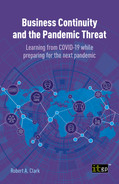CHAPTER 17: TIME YET FOR A REVIEW?
It was about two months after the WHO had declared COVID-19 to be a pandemic that a colleague suggested that the time was possibly approaching when we should consider starting a review. He argued that the pandemic would soon be over and we needed to capture the lessons to be learned regarding the damage the SARS-CoV-2 coronavirus outbreak had caused. He was considering not only the obvious mounting human cost, but the disruption to the global economy and business communities.
Despite his expression of positivity at the time, unfortunately a potentially discouraging word of caution was perhaps more fitting. We should be circumspect about allowing ourselves to be lured into what may be a premature false sense of optimism, despite various countries having commenced their vaccination programmes. Even former US President Trump has long since curbed his initial enthusiastic ‘it will all be over by Easter 2020’ stance, especially as confirmed COVID-19 cases in the US continued to increase with alarming momentum.
The reality is that there continues to be a lot more we need to learn about this virus. Every country can invariably learn from other countries in terms of both actions that had positive outcomes and those that didn’t.
History tells us that pandemics can last for as long as two years, and they can come in waves. Furthermore, the UN Secretary General Antonio Guterres warned us that if countries cannot learn to unite against coronavirus, the pandemic could last for as many as 5-7 years (Guterres,2020). Despite his unambiguous warning, there certainly has been no shortage of nationalistic isolation examples around the world. However, we should certainly be collecting information that may ultimately prove useful when the time is right to look back and create an honest appraisal of how we did.
• What did we do well?
• What could we have done better?
• What was a total disaster?
• What opportunities did we miss and what opportunities did we exploit?
• Is there something that perhaps one country did or didn’t do that made a significant difference (which could have a positive or negative outcome)?
This will apply to every business, every country and its leaders, and more importantly to global civilisation itself. It is only a matter of time before another pandemic will come our way and next time there will not be any justification in asking: “Why did no one warn us?”
In conclusion, although there is absolutely no harm in keeping a record of how the pandemic affects your organisation, to reiterate, it really is too soon to start a formal review until the pandemic is over. In the meantime, remember that despite any encouraging statistics that may emerge in terms of a reduction in new cases and fatalities, this coronavirus is likely to be with us for some time to come. We need to accept that COVID-19 may well continue to loiter with intent for some time to come.
When the time is right, in looking back in hindsight, it would be useful to have documented what went well, what perhaps could have been done better and even what was a complete disaster. For some organisations there may even be some unexpected opportunities created and better ways of going about their business. But for those who are keen to see what lessons are being learned and what conclusions are already coming downstream, there are a number of trustworthy forums that they can tap for information. Of particular note is The Lancet COVID-19 Commission. In addition to being a major report, it is also providing real-time commentary and assessment of responses by making its publications available in peer-reviewed journals (Lancet, 2021).
